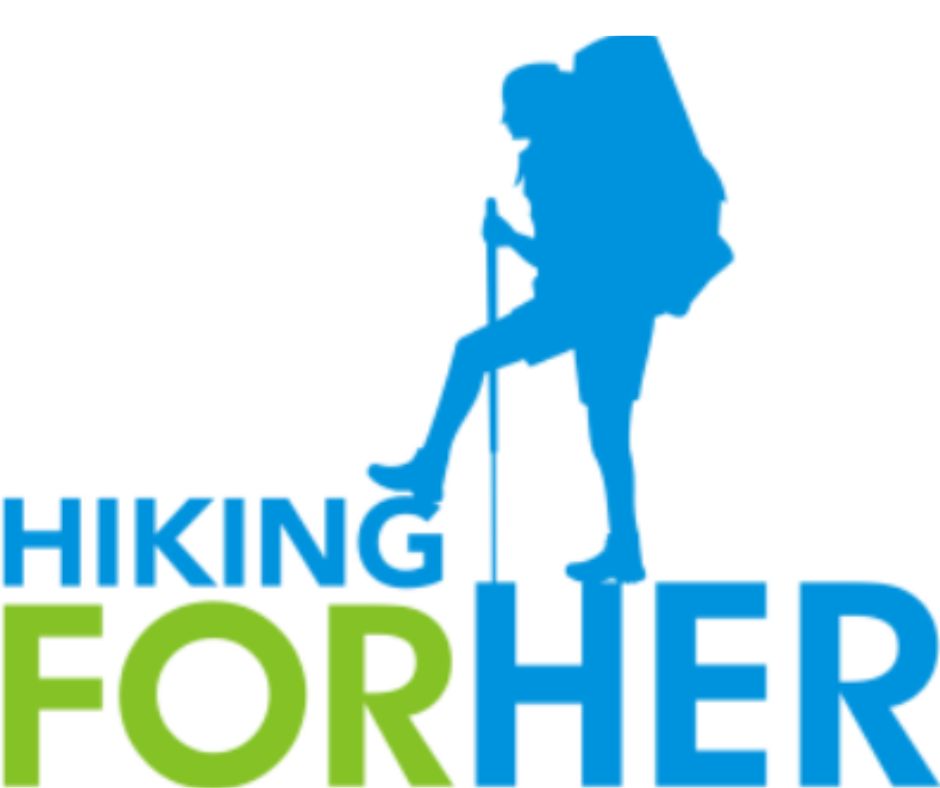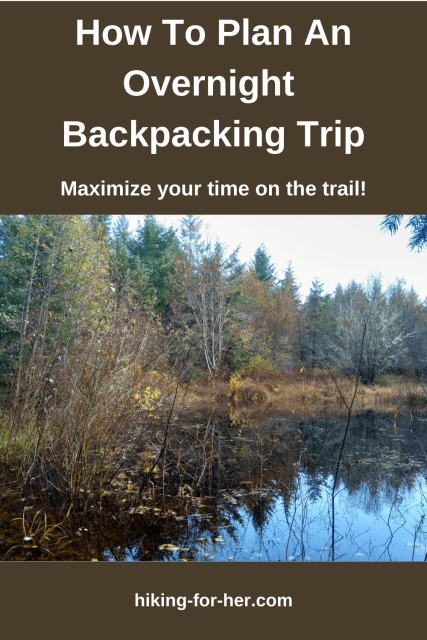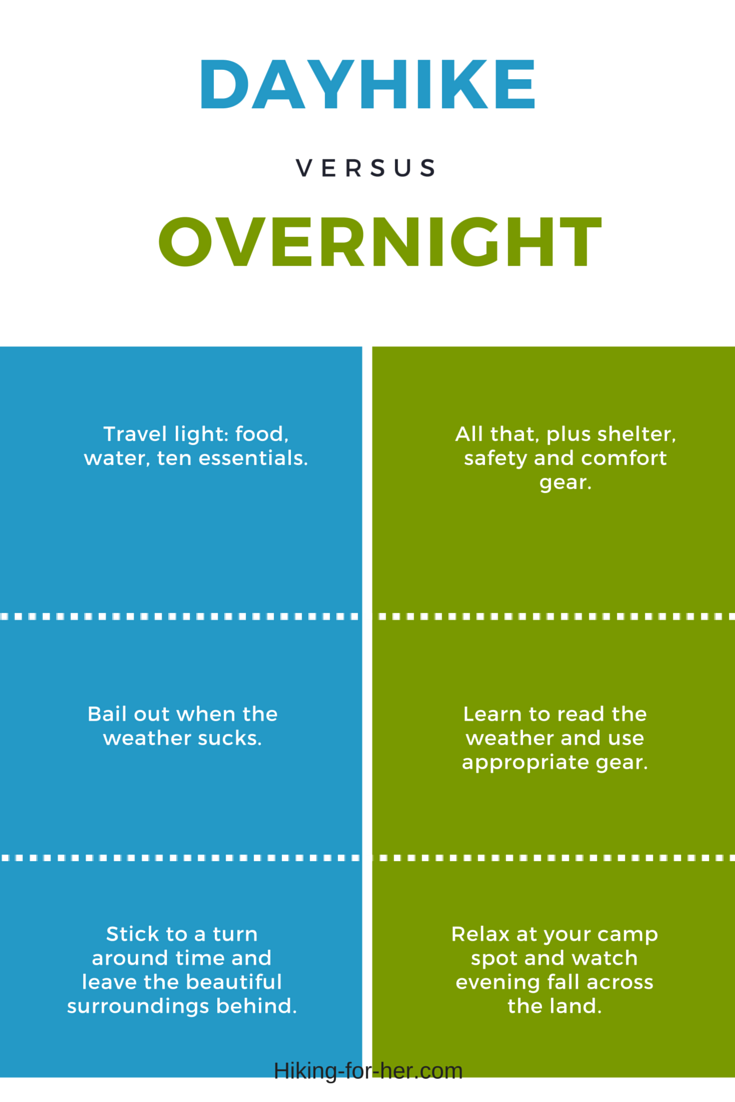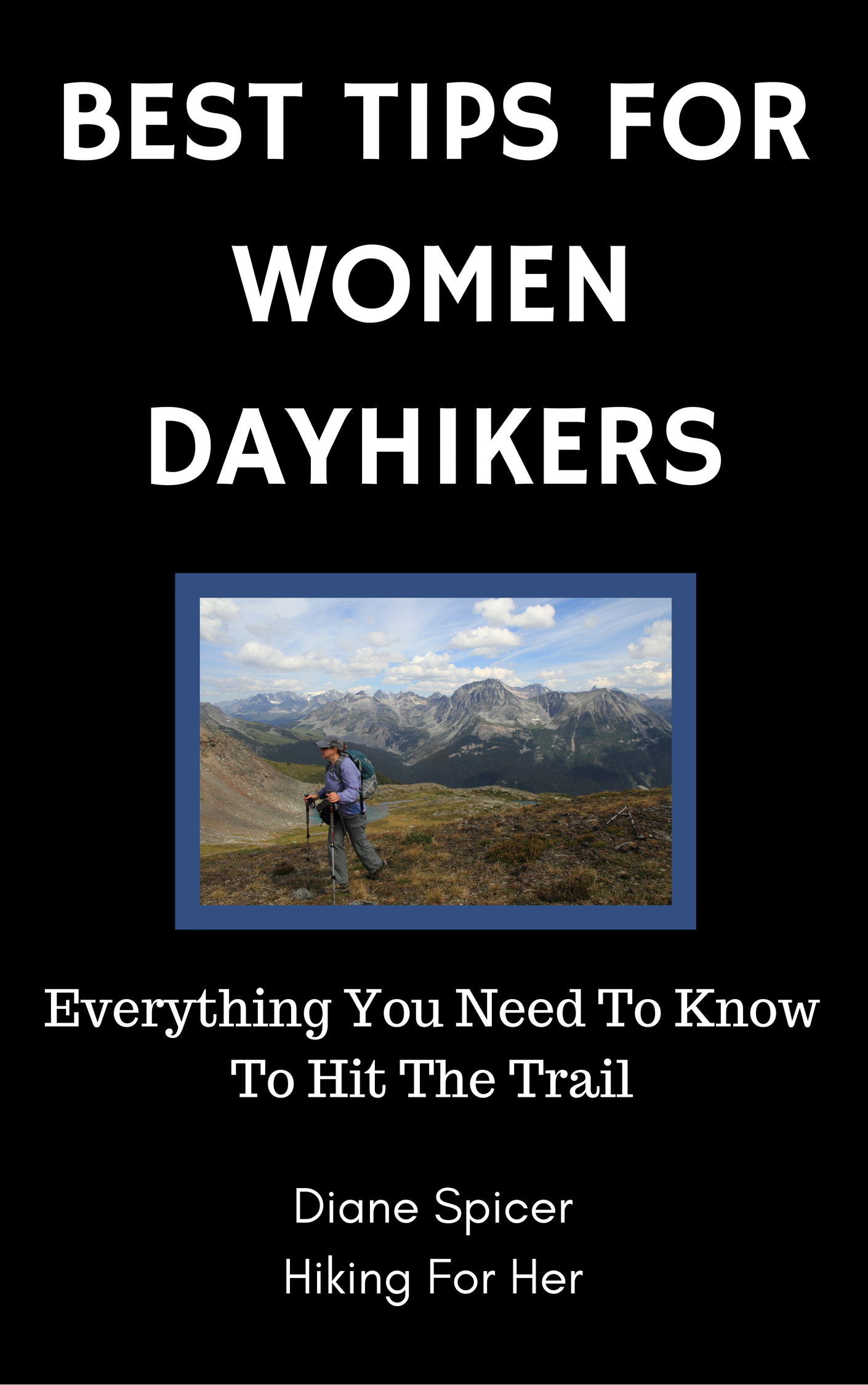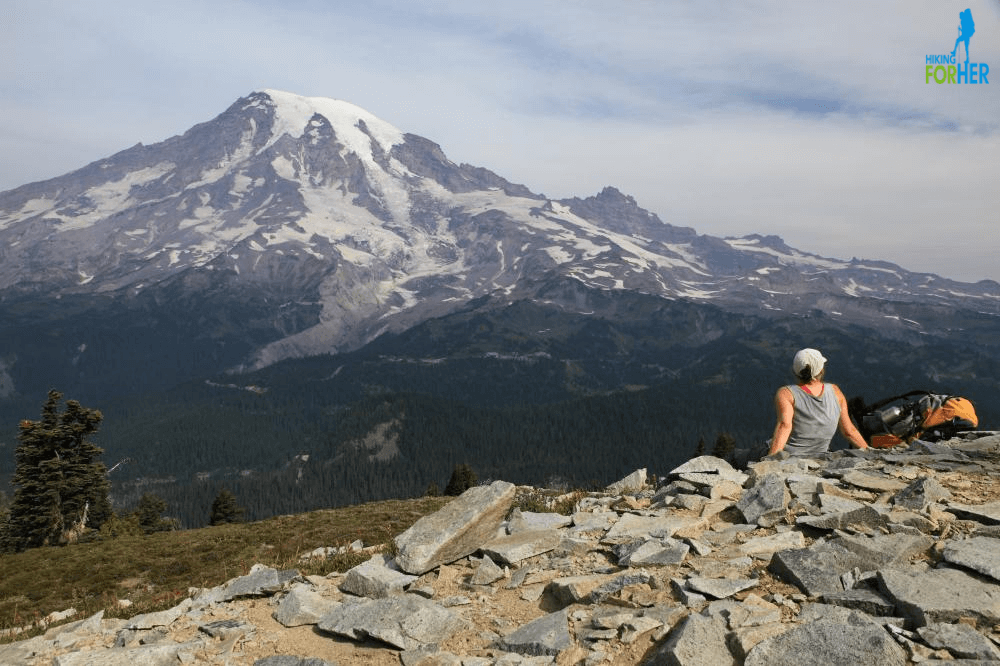Overnight Backpacking Trips:
Best Planning Tips
For A Night Or Two
By Diane Spicer
So you're thinking about doing a few overnight backpacking trips for the upcoming hiking season?
Or maybe weekend backpacking trips for two nights at most?
Congratulations!
There's nothing better than NOT having to turn around and retrace your steps after a long dayhike.
You can settle into your campsite, cook (or at least warm up) a great meal, and watch the evening shadows gather.
You'll have a good chance of seeing wildlife as the dayhikers clear out and dusk approaches.
And on clear nights, the star show alone is worth the price of admission (which was just a little lactic acid, a bit of perspiration, and maybe a few sore toes, right?).
Gearing up
for overnight and weekend backpacking
Convinced you want to make the extra investment in time, energy and gear to camp overnight or at most two nights?
Let's go over a list of things to consider before you head out on your 1st overnight backpacking trip.
Or take your time and ponder whether you have these, or will need them, on your first few overnight adventures.
Psst! Short cut to best overnight hike planning tips here
Take the right food on
overnight backpacking trips
Food preparation should not consume your one precious evening in the back country.
The exception would be if you pride yourself on your cooking skills, or are trying a recipe that sounded yummy while reading magazines in the doctor's waiting room.
By all means, enjoy the experience.
- Here are a few backpacking food ideas.
Just keep a clean camp and stow your food after dinner in an appropriately safe manner:
- hang it from a tree in a rodent proof bag;
- use a bear cannister;
- make use of animal proof receptacles, if provided at your campsite.
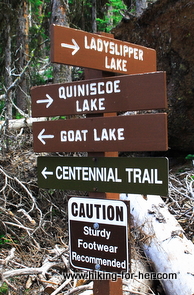 Choose your weekend backpacking trip destination carefully to maximize your short time frame
Choose your weekend backpacking trip destination carefully to maximize your short time frameBring adequate shelter on
overnight backpacking trips
Shelter can be:
- minimalist (just a bivvy bag under the stars),
- bare-bones (tarp strung between 2 trees, no floor or sides), or
- a deluxe backpacking tent - Look ma! Doors AND windows!
The more deluxe the accommodations, the heavier the pack: a sad but true hiking mantra.
If this is your very 1st overnighter, I hope you're with someone who's experienced with this type of hiking and has brought along a tent.
It will make your night more comfortable and will eliminate any animal or insect-related worries that you might have.
If you're considering a solo trip, check this out.
Hiking clothing for
overnight backpacking trips
Clothing for an overnight backpacking trip must address two needs:
- trail time
- comfortable sleeping
Depending on the season, you could get by with very few clothes (thus lightening your pack), or you might need more: long underwear, a fleece or wool hat, and clean, dry socks to sleep in.
Some people simply sleep in the clothes they wore on the trail.
I find this objectionable for several reasons.
- Damp, smelly clothes
prevent me from falling asleep, especially dirty socks.
- Cooking odors or other scents from sunscreen, cosmetics, personal hygiene products which make their way into clothing could attract animals.
- And my hiking clothes, especially the sports bra and waist band on my pants, are too tight and constrictive to make me feel relaxed in my sleeping bag.
So I recommend bringing long underwear to sleep in, with the added luxury of a pair of clean socks if your feet tend to get cold.
If you're a strong hiker and brought along a set of clean clothes for the morning, put them in the bottom of your sleeping bag so they're toasty warm in the morning.
Or use them as a pillow!
Sleeping bag:
gotta have a good one!
Sleeping bags for hikers run the gamut from lousy & cheap to overpriced and heavy.
How to figure out the difference?
Borrow a sleeping bag from someone, or rent one, or at least comb through several gear websites looking for a reasonably priced, light, and washable bag for your first season.
Once you've spent a few nights in a bag (or sometimes even just a few minutes!!), you'll know if it's too restrictive, too cold, too big, too heavy, or just the ticket.
I highly recommend a woman's sleeping bag. The cut is closer to your body size, and you won't have a lot of dead air space to heat up with your body heat.
Down -vs- synthetic is the perennial dilemma.
- Down is lightweight but
when it's wet, it's soggy! It does trap heat, though, wet or dry.
- Synthetics are a universe unto themselves,
and require careful research before you make a purchase. If you're in really wet conditions, you might want these over down.
More tips on figuring out what you need for comfy sleep here.
To go through all of your options, you should also consider a backpacking quilt.
Treat your feet right!
They're taking you
home tomorrow
Boots for your overnight backpacking trip can be the same boots you wear on your day hiking adventures.
Ditto for your hiking socks.
Just be sure you have some blister avoidance strategies firmly in place.
And deal with your sore toes with these tips.
Comfort items on
weekend backpacking trips
Comfort items on overnight backpacking trips can include the aforementioned change of clothing for the next day, the luxury of clean dry socks, and a personal hygiene kit.
- Teddy bears are optional
It can be as easy as this:
I found a great little gray and black canvas zip bag at Target in the dollar bin that easily holds my ultralight toothbrush (also a dollar in a neighboring bin at Target, AND it came with a Barbie doll sized tube of toothpaste).
Throw in a teensy roll of dental floss, hairbrush (collapsible,
plastic, and guess where I found it??), small plastic bottle of odorless
facial soap (like unscented Dr. Bronners), tiny screw top jar of face
cream, and an extra Scrunchy for long hair.
Be sure to pack whatever says "body comfort" to you, but don't lug full sized versions into the back country.
This is a great excuse to browse the trial sizes at your favorite store!
Trail tip:
Leave any smelly fragrances at home, or put them into the food storage unit (bear bag, canister, whatever you're using) rather than your tent.
Lots more comfort tips here!
Limit your fluid intake
after dinner
Here's a strong word to the wise:
Skip the after-dinner mug of hot chocolate or tea if you want to remain cozy warm inside of your sleeping bag all night.
Trips to visit the trees at midnight, clutching your flashlight while trying to NOT hear the rustling in the undergrowth two feet away from you, are not recommended on your first overnight backpacking trip.
Save that fun for later hiking trips!
But if you must visit the trees before sunrise, a head lamp, rather than a flashlight is highly recommended.
That way, you can use both hands to get your bottoms up and down in record time.
Try a night hike after dinner
You worked hard to camp under the starry skies.
But maybe you're too wound up to fall asleep.
Why not use these night hiking tips to learn a new skill?
Home page > Best Hiking Tips >
Overnight Backpacking Trips
|
I get emails all the time about what I wear, eat, carry and love to use on the trail. That's
why I provide affiliate links to you: the best gear that I use myself and have seen used by other hikers is instantly
available for your consideration, and the gear company sends a few
pennies per dollar to this reader-supported hiking website. There is no added cost to you! Everyone ends up a winner: Great gear for you, strong gear companies, and more free hiking tips for everyone. Thanks very much for your support. It's warmly and sincerely appreciated. It also helps send these hiking tips to all your virtual trail buddies around the globe. |
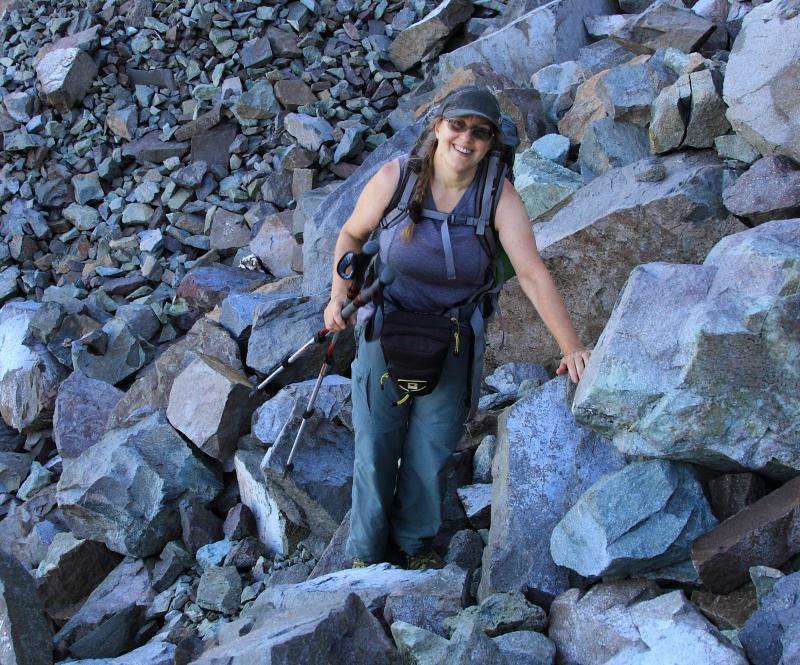 |
